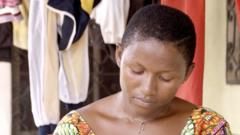The struggle for independence in Cameroon’s South-West region has left communities devastated and families mourning their loved ones. Ngabi Dora Tue, who lost her husband, Johnson Mabia, four years ago to separatist militants, encapsulates the grief and uncertainty that has plagued this region for nearly a decade. Johnson and his colleagues were captured during a work trip, and after a ransom demand of over $55,000 was made, their fate took a tragic turn.
The abduction of civilians like Johnson highlights a broader conflict rooted in grievances that date back to the country’s formation as a single state in 1972. English-speaking Cameroonians have long felt marginalized, leading to protests that spiraled into violence following armed declarations of independence from the separatist leaders.
Armed groups emerged in late 2017 as the government forcefully suppressed protests against the imposition of the Francophone legal system on English-speaking regions. Cameroonian defense forces responded vigorously, leading to accusations of extrajudicial killings, torture, and mass arrests from watchdog organizations, including Human Rights Watch.
The dire consequences of the conflict are felt by many, including journalist Blaise Eyong who fled his hometown due to the escalating violence. “We used to wake up in the morning to dead bodies on the streets,” he recalls, a sentiment that resonates across countless communities where everyday life has turned into a battleground.
Despite resolutions proposed in national dialogues, the situation remains largely unresolved, giving way to a disillusionment that inspires mutual distrust between separatist groups and government forces. Recent developments have seen a rise in vigilante groups combating the separatists, further complicating an already volatile situation.
Tragic stories of abduction and execution are common, with individuals such as Joe (pseudonym) recalling harrowing experiences that remind many of the importance of safety and the impact on family life. Those left behind, like Ngabi Dora, face immense hardships as they navigate their daily struggles and worry about the future.
“Imagine the impact this will have for our communities and also for our country,” stresses journalist Eyong, pointing to the staggering number of schools forced to shut down, creating a lost generation of children whose education has been stunted due to the conflict.
Surviving families now contend with overwhelming challenges after these violent incidents, with many, like Ngabi, grappling with debt and uncertainty about survival. “I was very young to become a widow,” she shares amidst her grief.
The Ambazonia Defense Forces, the principal separatist group, deny involvement in the violence against civilians and claim their operations adhere to international law, attempting to distance their struggle from acts that create animosity among the communities they claim to represent.
As this tragic cycle of violence continues, the call for peace and a resolution to the crisis becomes ever more urgent, leaving the future of many Cameroonians hanging in the balance.





















